A Comparative Analysis & Design of Language for Banking Domain
VerifiedAdded on 2022/09/16
|11
|2300
|16
Report
AI Summary
This report provides a theoretical design for a programming language tailored for the banking domain, considering aspects of business, finance, and customer relations. It focuses on key features such as performance, data types, code maintenance, design flexibility, and robustness, while also touching upon security. The design incorporates compilation methods, memory management, and scoping features, emphasizing simplicity, orthogonality, and appropriate syntax. The report further discusses abstraction, expressivity, type checking, and exception handling to ensure reliability, readability, and writability, aiming to assist programmers in creating simple and reliable programs for the banking sector. It concludes that this language will support banking operations in business, finance, and customer relationship management.
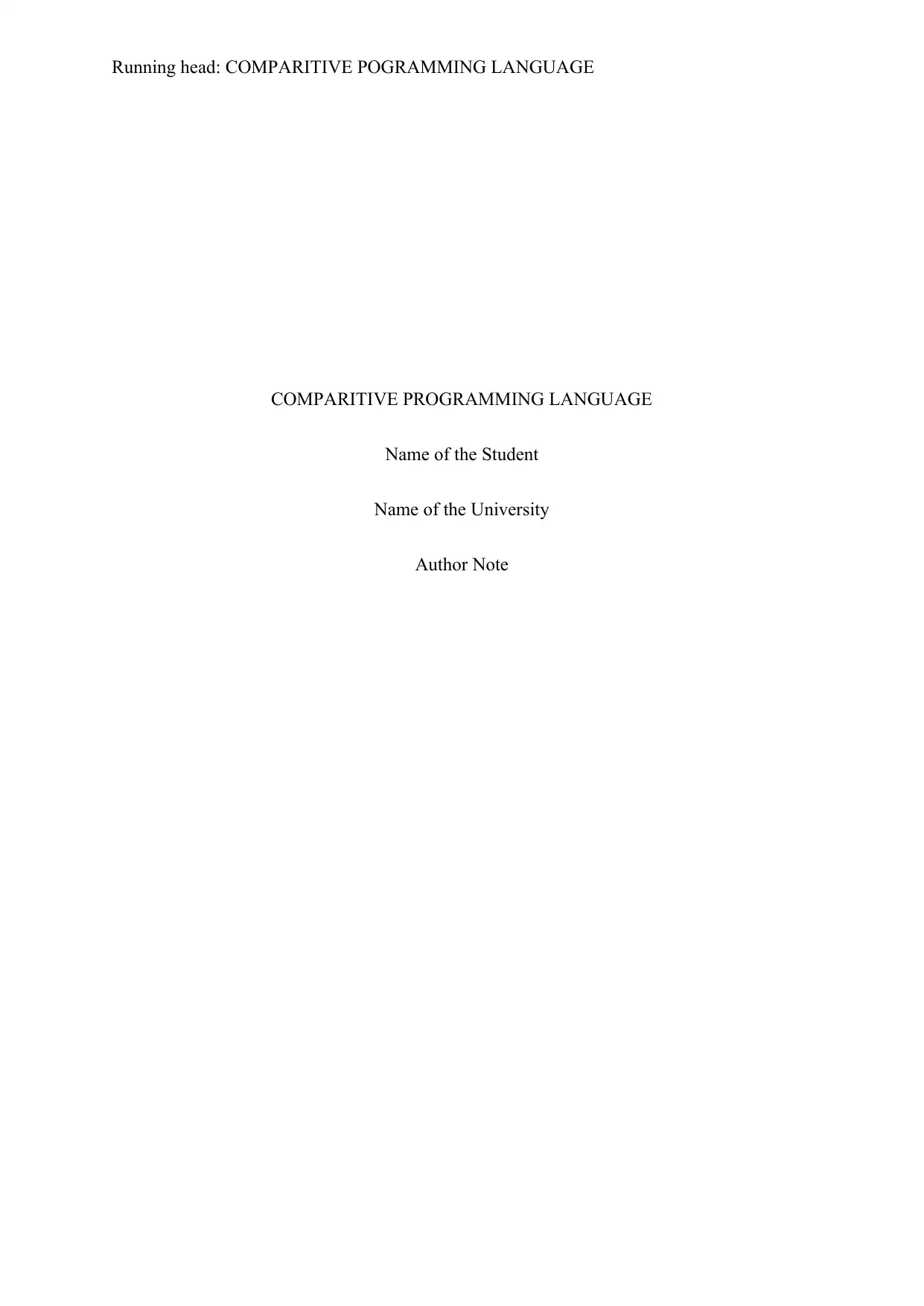
Running head: COMPARITIVE POGRAMMING LANGUAGE
COMPARITIVE PROGRAMMING LANGUAGE
Name of the Student
Name of the University
Author Note
COMPARITIVE PROGRAMMING LANGUAGE
Name of the Student
Name of the University
Author Note
Paraphrase This Document
Need a fresh take? Get an instant paraphrase of this document with our AI Paraphraser
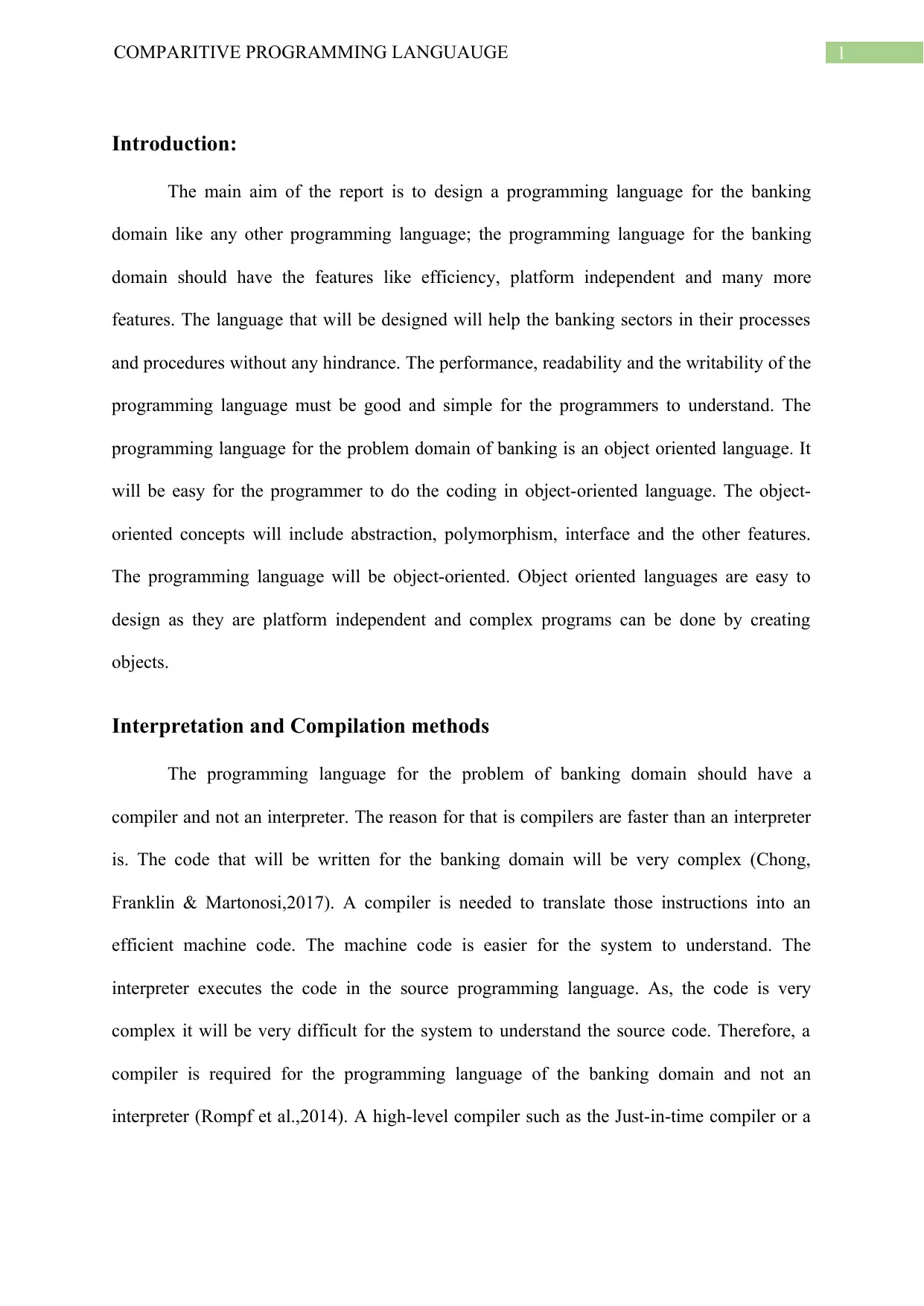
1COMPARITIVE PROGRAMMING LANGUAUGE
Introduction:
The main aim of the report is to design a programming language for the banking
domain like any other programming language; the programming language for the banking
domain should have the features like efficiency, platform independent and many more
features. The language that will be designed will help the banking sectors in their processes
and procedures without any hindrance. The performance, readability and the writability of the
programming language must be good and simple for the programmers to understand. The
programming language for the problem domain of banking is an object oriented language. It
will be easy for the programmer to do the coding in object-oriented language. The object-
oriented concepts will include abstraction, polymorphism, interface and the other features.
The programming language will be object-oriented. Object oriented languages are easy to
design as they are platform independent and complex programs can be done by creating
objects.
Interpretation and Compilation methods
The programming language for the problem of banking domain should have a
compiler and not an interpreter. The reason for that is compilers are faster than an interpreter
is. The code that will be written for the banking domain will be very complex (Chong,
Franklin & Martonosi,2017). A compiler is needed to translate those instructions into an
efficient machine code. The machine code is easier for the system to understand. The
interpreter executes the code in the source programming language. As, the code is very
complex it will be very difficult for the system to understand the source code. Therefore, a
compiler is required for the programming language of the banking domain and not an
interpreter (Rompf et al.,2014). A high-level compiler such as the Just-in-time compiler or a
Introduction:
The main aim of the report is to design a programming language for the banking
domain like any other programming language; the programming language for the banking
domain should have the features like efficiency, platform independent and many more
features. The language that will be designed will help the banking sectors in their processes
and procedures without any hindrance. The performance, readability and the writability of the
programming language must be good and simple for the programmers to understand. The
programming language for the problem domain of banking is an object oriented language. It
will be easy for the programmer to do the coding in object-oriented language. The object-
oriented concepts will include abstraction, polymorphism, interface and the other features.
The programming language will be object-oriented. Object oriented languages are easy to
design as they are platform independent and complex programs can be done by creating
objects.
Interpretation and Compilation methods
The programming language for the problem of banking domain should have a
compiler and not an interpreter. The reason for that is compilers are faster than an interpreter
is. The code that will be written for the banking domain will be very complex (Chong,
Franklin & Martonosi,2017). A compiler is needed to translate those instructions into an
efficient machine code. The machine code is easier for the system to understand. The
interpreter executes the code in the source programming language. As, the code is very
complex it will be very difficult for the system to understand the source code. Therefore, a
compiler is required for the programming language of the banking domain and not an
interpreter (Rompf et al.,2014). A high-level compiler such as the Just-in-time compiler or a
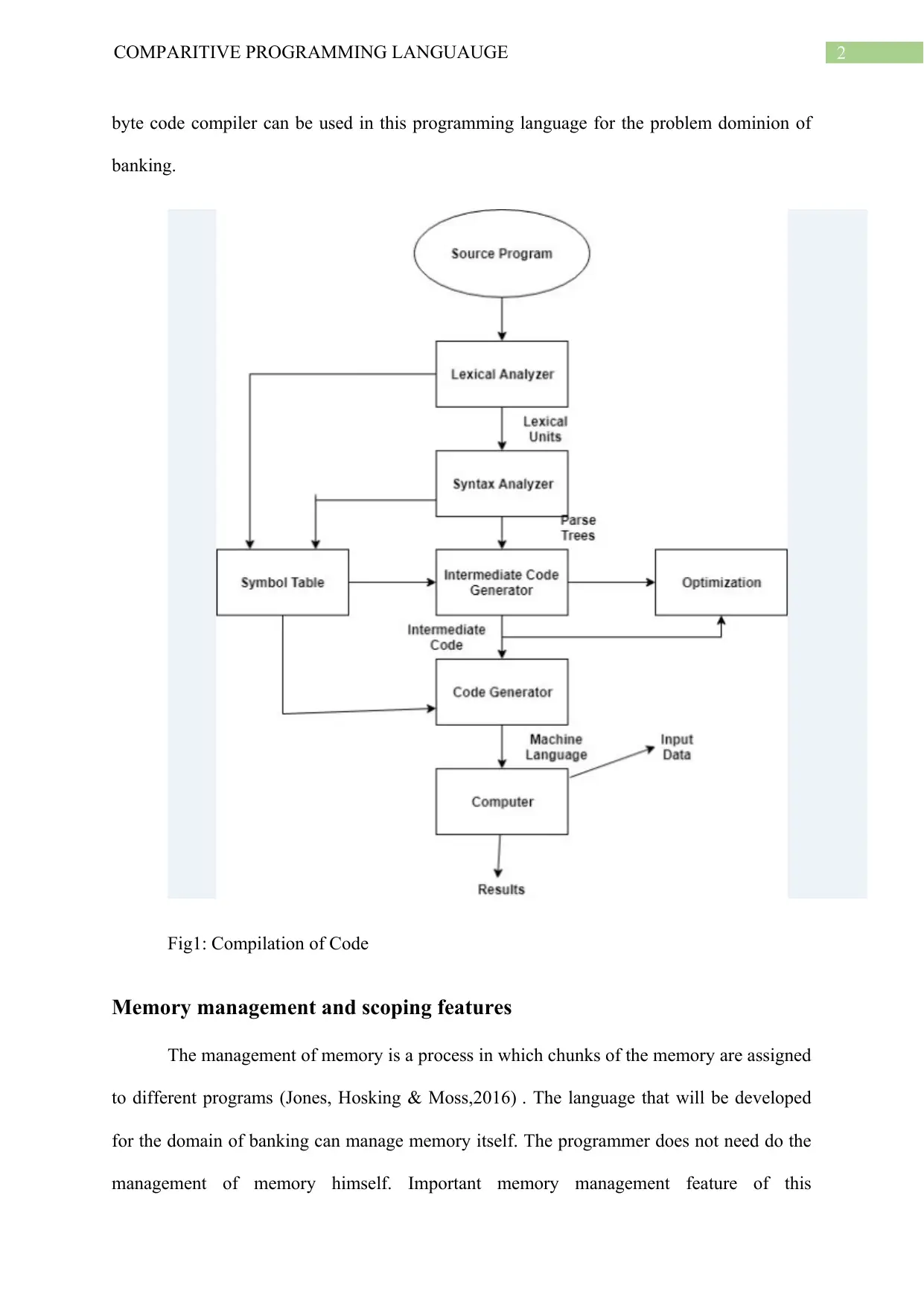
2COMPARITIVE PROGRAMMING LANGUAUGE
byte code compiler can be used in this programming language for the problem dominion of
banking.
Fig1: Compilation of Code
Memory management and scoping features
The management of memory is a process in which chunks of the memory are assigned
to different programs (Jones, Hosking & Moss,2016) . The language that will be developed
for the domain of banking can manage memory itself. The programmer does not need do the
management of memory himself. Important memory management feature of this
byte code compiler can be used in this programming language for the problem dominion of
banking.
Fig1: Compilation of Code
Memory management and scoping features
The management of memory is a process in which chunks of the memory are assigned
to different programs (Jones, Hosking & Moss,2016) . The language that will be developed
for the domain of banking can manage memory itself. The programmer does not need do the
management of memory himself. Important memory management feature of this
⊘ This is a preview!⊘
Do you want full access?
Subscribe today to unlock all pages.

Trusted by 1+ million students worldwide
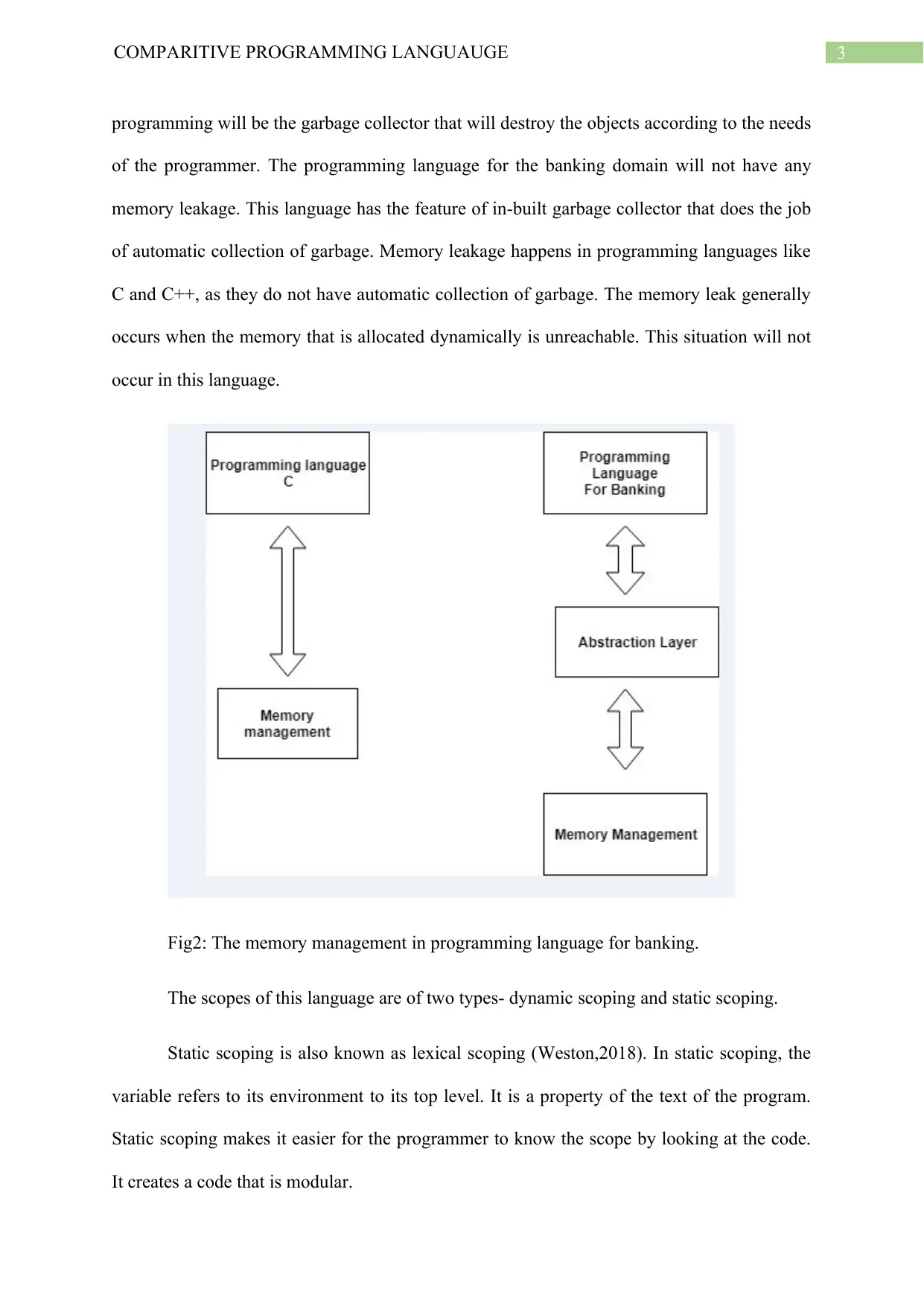
3COMPARITIVE PROGRAMMING LANGUAUGE
programming will be the garbage collector that will destroy the objects according to the needs
of the programmer. The programming language for the banking domain will not have any
memory leakage. This language has the feature of in-built garbage collector that does the job
of automatic collection of garbage. Memory leakage happens in programming languages like
C and C++, as they do not have automatic collection of garbage. The memory leak generally
occurs when the memory that is allocated dynamically is unreachable. This situation will not
occur in this language.
Fig2: The memory management in programming language for banking.
The scopes of this language are of two types- dynamic scoping and static scoping.
Static scoping is also known as lexical scoping (Weston,2018). In static scoping, the
variable refers to its environment to its top level. It is a property of the text of the program.
Static scoping makes it easier for the programmer to know the scope by looking at the code.
It creates a code that is modular.
programming will be the garbage collector that will destroy the objects according to the needs
of the programmer. The programming language for the banking domain will not have any
memory leakage. This language has the feature of in-built garbage collector that does the job
of automatic collection of garbage. Memory leakage happens in programming languages like
C and C++, as they do not have automatic collection of garbage. The memory leak generally
occurs when the memory that is allocated dynamically is unreachable. This situation will not
occur in this language.
Fig2: The memory management in programming language for banking.
The scopes of this language are of two types- dynamic scoping and static scoping.
Static scoping is also known as lexical scoping (Weston,2018). In static scoping, the
variable refers to its environment to its top level. It is a property of the text of the program.
Static scoping makes it easier for the programmer to know the scope by looking at the code.
It creates a code that is modular.
Paraphrase This Document
Need a fresh take? Get an instant paraphrase of this document with our AI Paraphraser
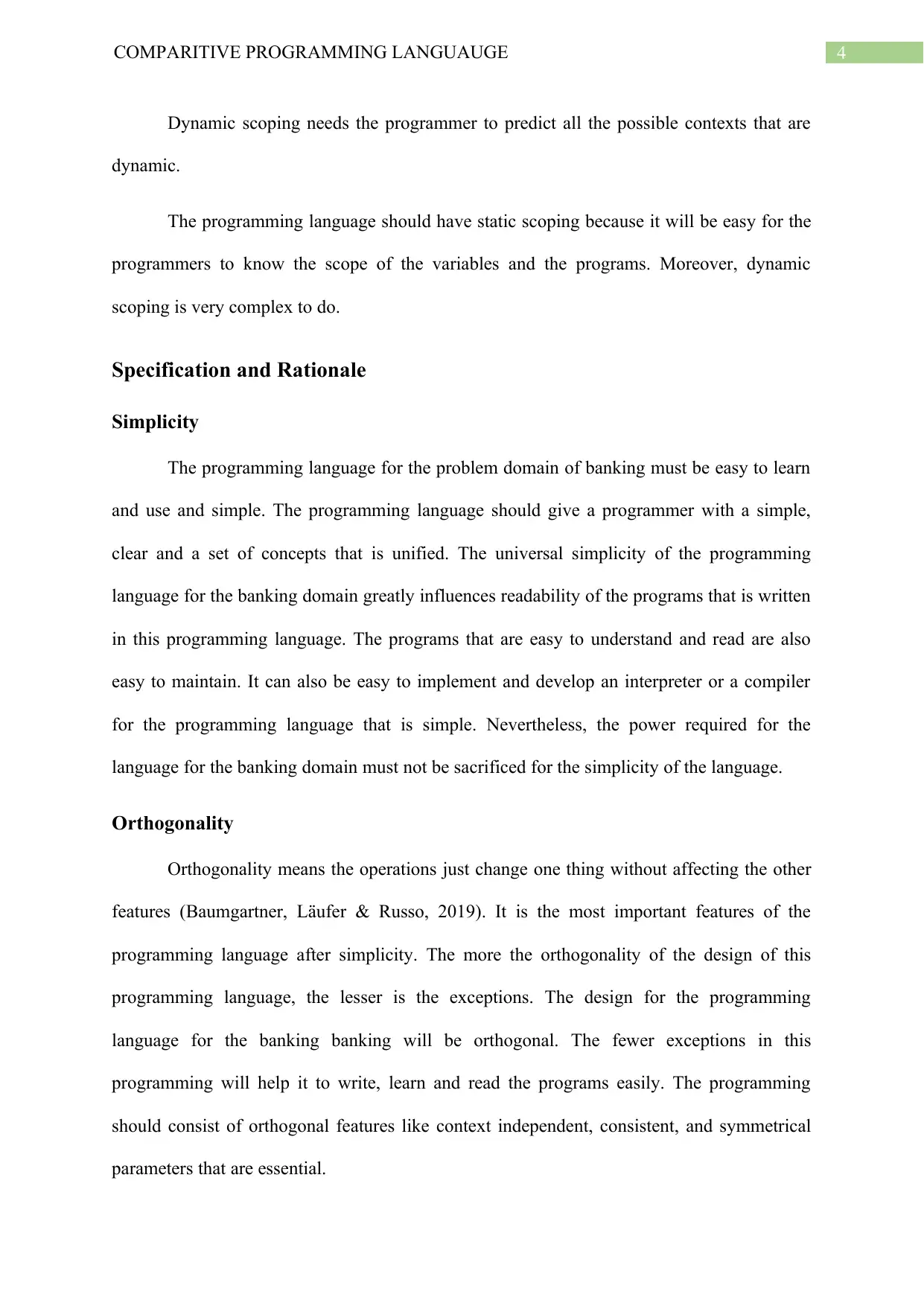
4COMPARITIVE PROGRAMMING LANGUAUGE
Dynamic scoping needs the programmer to predict all the possible contexts that are
dynamic.
The programming language should have static scoping because it will be easy for the
programmers to know the scope of the variables and the programs. Moreover, dynamic
scoping is very complex to do.
Specification and Rationale
Simplicity
The programming language for the problem domain of banking must be easy to learn
and use and simple. The programming language should give a programmer with a simple,
clear and a set of concepts that is unified. The universal simplicity of the programming
language for the banking domain greatly influences readability of the programs that is written
in this programming language. The programs that are easy to understand and read are also
easy to maintain. It can also be easy to implement and develop an interpreter or a compiler
for the programming language that is simple. Nevertheless, the power required for the
language for the banking domain must not be sacrificed for the simplicity of the language.
Orthogonality
Orthogonality means the operations just change one thing without affecting the other
features (Baumgartner, Läufer & Russo, 2019). It is the most important features of the
programming language after simplicity. The more the orthogonality of the design of this
programming language, the lesser is the exceptions. The design for the programming
language for the banking banking will be orthogonal. The fewer exceptions in this
programming will help it to write, learn and read the programs easily. The programming
should consist of orthogonal features like context independent, consistent, and symmetrical
parameters that are essential.
Dynamic scoping needs the programmer to predict all the possible contexts that are
dynamic.
The programming language should have static scoping because it will be easy for the
programmers to know the scope of the variables and the programs. Moreover, dynamic
scoping is very complex to do.
Specification and Rationale
Simplicity
The programming language for the problem domain of banking must be easy to learn
and use and simple. The programming language should give a programmer with a simple,
clear and a set of concepts that is unified. The universal simplicity of the programming
language for the banking domain greatly influences readability of the programs that is written
in this programming language. The programs that are easy to understand and read are also
easy to maintain. It can also be easy to implement and develop an interpreter or a compiler
for the programming language that is simple. Nevertheless, the power required for the
language for the banking domain must not be sacrificed for the simplicity of the language.
Orthogonality
Orthogonality means the operations just change one thing without affecting the other
features (Baumgartner, Läufer & Russo, 2019). It is the most important features of the
programming language after simplicity. The more the orthogonality of the design of this
programming language, the lesser is the exceptions. The design for the programming
language for the banking banking will be orthogonal. The fewer exceptions in this
programming will help it to write, learn and read the programs easily. The programming
should consist of orthogonal features like context independent, consistent, and symmetrical
parameters that are essential.
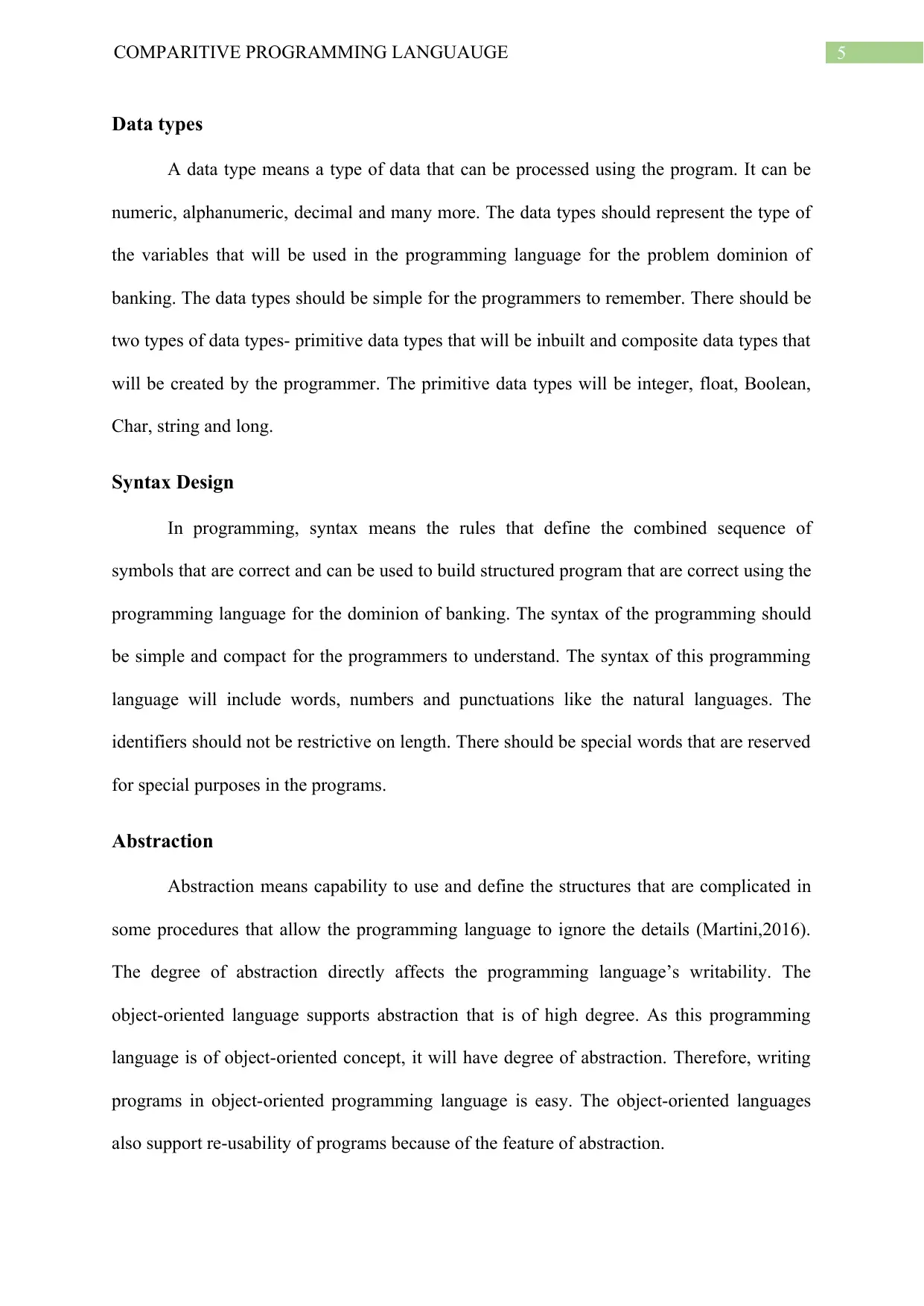
5COMPARITIVE PROGRAMMING LANGUAUGE
Data types
A data type means a type of data that can be processed using the program. It can be
numeric, alphanumeric, decimal and many more. The data types should represent the type of
the variables that will be used in the programming language for the problem dominion of
banking. The data types should be simple for the programmers to remember. There should be
two types of data types- primitive data types that will be inbuilt and composite data types that
will be created by the programmer. The primitive data types will be integer, float, Boolean,
Char, string and long.
Syntax Design
In programming, syntax means the rules that define the combined sequence of
symbols that are correct and can be used to build structured program that are correct using the
programming language for the dominion of banking. The syntax of the programming should
be simple and compact for the programmers to understand. The syntax of this programming
language will include words, numbers and punctuations like the natural languages. The
identifiers should not be restrictive on length. There should be special words that are reserved
for special purposes in the programs.
Abstraction
Abstraction means capability to use and define the structures that are complicated in
some procedures that allow the programming language to ignore the details (Martini,2016).
The degree of abstraction directly affects the programming language’s writability. The
object-oriented language supports abstraction that is of high degree. As this programming
language is of object-oriented concept, it will have degree of abstraction. Therefore, writing
programs in object-oriented programming language is easy. The object-oriented languages
also support re-usability of programs because of the feature of abstraction.
Data types
A data type means a type of data that can be processed using the program. It can be
numeric, alphanumeric, decimal and many more. The data types should represent the type of
the variables that will be used in the programming language for the problem dominion of
banking. The data types should be simple for the programmers to remember. There should be
two types of data types- primitive data types that will be inbuilt and composite data types that
will be created by the programmer. The primitive data types will be integer, float, Boolean,
Char, string and long.
Syntax Design
In programming, syntax means the rules that define the combined sequence of
symbols that are correct and can be used to build structured program that are correct using the
programming language for the dominion of banking. The syntax of the programming should
be simple and compact for the programmers to understand. The syntax of this programming
language will include words, numbers and punctuations like the natural languages. The
identifiers should not be restrictive on length. There should be special words that are reserved
for special purposes in the programs.
Abstraction
Abstraction means capability to use and define the structures that are complicated in
some procedures that allow the programming language to ignore the details (Martini,2016).
The degree of abstraction directly affects the programming language’s writability. The
object-oriented language supports abstraction that is of high degree. As this programming
language is of object-oriented concept, it will have degree of abstraction. Therefore, writing
programs in object-oriented programming language is easy. The object-oriented languages
also support re-usability of programs because of the feature of abstraction.
⊘ This is a preview!⊘
Do you want full access?
Subscribe today to unlock all pages.

Trusted by 1+ million students worldwide
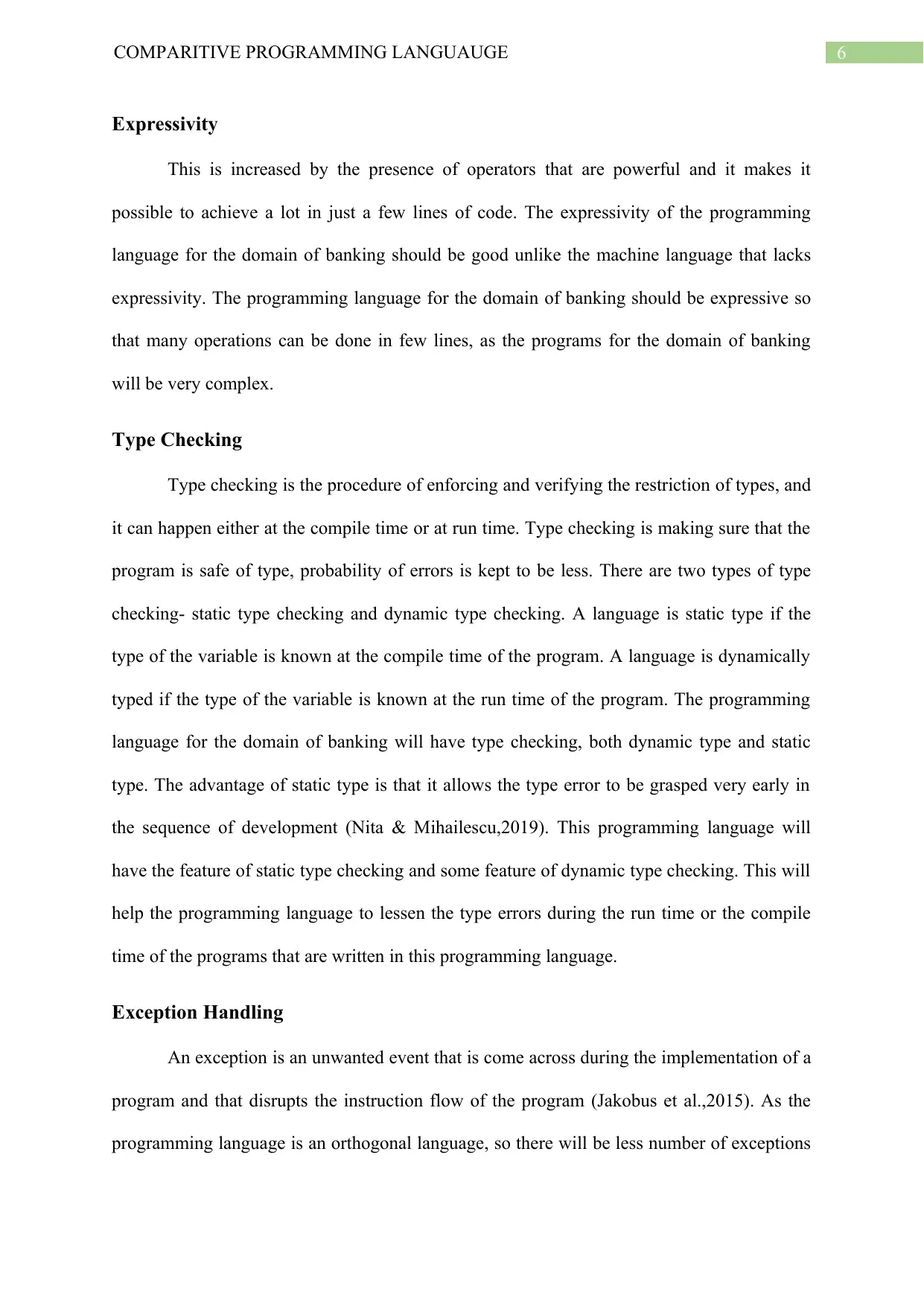
6COMPARITIVE PROGRAMMING LANGUAUGE
Expressivity
This is increased by the presence of operators that are powerful and it makes it
possible to achieve a lot in just a few lines of code. The expressivity of the programming
language for the domain of banking should be good unlike the machine language that lacks
expressivity. The programming language for the domain of banking should be expressive so
that many operations can be done in few lines, as the programs for the domain of banking
will be very complex.
Type Checking
Type checking is the procedure of enforcing and verifying the restriction of types, and
it can happen either at the compile time or at run time. Type checking is making sure that the
program is safe of type, probability of errors is kept to be less. There are two types of type
checking- static type checking and dynamic type checking. A language is static type if the
type of the variable is known at the compile time of the program. A language is dynamically
typed if the type of the variable is known at the run time of the program. The programming
language for the domain of banking will have type checking, both dynamic type and static
type. The advantage of static type is that it allows the type error to be grasped very early in
the sequence of development (Nita & Mihailescu,2019). This programming language will
have the feature of static type checking and some feature of dynamic type checking. This will
help the programming language to lessen the type errors during the run time or the compile
time of the programs that are written in this programming language.
Exception Handling
An exception is an unwanted event that is come across during the implementation of a
program and that disrupts the instruction flow of the program (Jakobus et al.,2015). As the
programming language is an orthogonal language, so there will be less number of exceptions
Expressivity
This is increased by the presence of operators that are powerful and it makes it
possible to achieve a lot in just a few lines of code. The expressivity of the programming
language for the domain of banking should be good unlike the machine language that lacks
expressivity. The programming language for the domain of banking should be expressive so
that many operations can be done in few lines, as the programs for the domain of banking
will be very complex.
Type Checking
Type checking is the procedure of enforcing and verifying the restriction of types, and
it can happen either at the compile time or at run time. Type checking is making sure that the
program is safe of type, probability of errors is kept to be less. There are two types of type
checking- static type checking and dynamic type checking. A language is static type if the
type of the variable is known at the compile time of the program. A language is dynamically
typed if the type of the variable is known at the run time of the program. The programming
language for the domain of banking will have type checking, both dynamic type and static
type. The advantage of static type is that it allows the type error to be grasped very early in
the sequence of development (Nita & Mihailescu,2019). This programming language will
have the feature of static type checking and some feature of dynamic type checking. This will
help the programming language to lessen the type errors during the run time or the compile
time of the programs that are written in this programming language.
Exception Handling
An exception is an unwanted event that is come across during the implementation of a
program and that disrupts the instruction flow of the program (Jakobus et al.,2015). As the
programming language is an orthogonal language, so there will be less number of exceptions
Paraphrase This Document
Need a fresh take? Get an instant paraphrase of this document with our AI Paraphraser
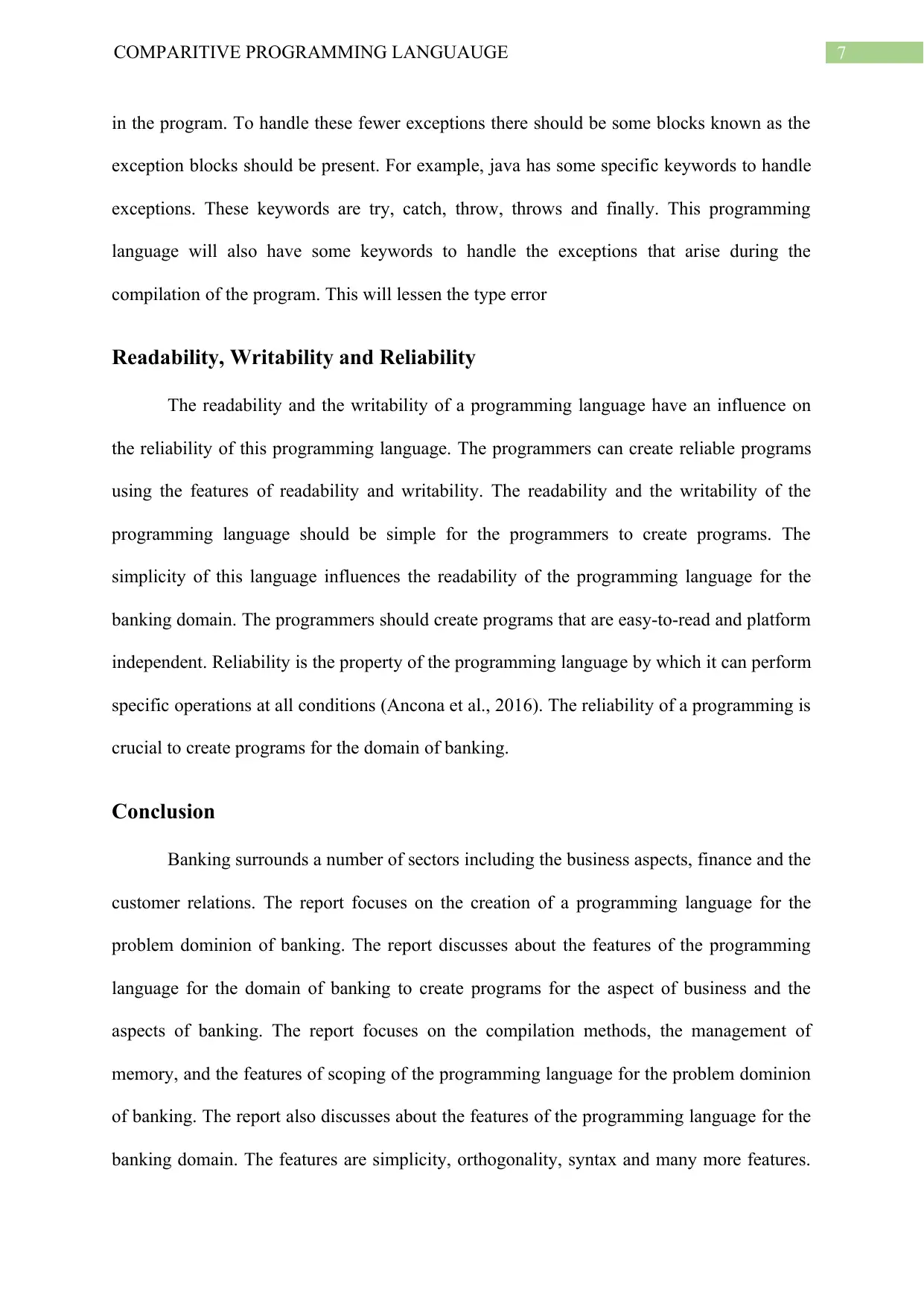
7COMPARITIVE PROGRAMMING LANGUAUGE
in the program. To handle these fewer exceptions there should be some blocks known as the
exception blocks should be present. For example, java has some specific keywords to handle
exceptions. These keywords are try, catch, throw, throws and finally. This programming
language will also have some keywords to handle the exceptions that arise during the
compilation of the program. This will lessen the type error
Readability, Writability and Reliability
The readability and the writability of a programming language have an influence on
the reliability of this programming language. The programmers can create reliable programs
using the features of readability and writability. The readability and the writability of the
programming language should be simple for the programmers to create programs. The
simplicity of this language influences the readability of the programming language for the
banking domain. The programmers should create programs that are easy-to-read and platform
independent. Reliability is the property of the programming language by which it can perform
specific operations at all conditions (Ancona et al., 2016). The reliability of a programming is
crucial to create programs for the domain of banking.
Conclusion
Banking surrounds a number of sectors including the business aspects, finance and the
customer relations. The report focuses on the creation of a programming language for the
problem dominion of banking. The report discusses about the features of the programming
language for the domain of banking to create programs for the aspect of business and the
aspects of banking. The report focuses on the compilation methods, the management of
memory, and the features of scoping of the programming language for the problem dominion
of banking. The report also discusses about the features of the programming language for the
banking domain. The features are simplicity, orthogonality, syntax and many more features.
in the program. To handle these fewer exceptions there should be some blocks known as the
exception blocks should be present. For example, java has some specific keywords to handle
exceptions. These keywords are try, catch, throw, throws and finally. This programming
language will also have some keywords to handle the exceptions that arise during the
compilation of the program. This will lessen the type error
Readability, Writability and Reliability
The readability and the writability of a programming language have an influence on
the reliability of this programming language. The programmers can create reliable programs
using the features of readability and writability. The readability and the writability of the
programming language should be simple for the programmers to create programs. The
simplicity of this language influences the readability of the programming language for the
banking domain. The programmers should create programs that are easy-to-read and platform
independent. Reliability is the property of the programming language by which it can perform
specific operations at all conditions (Ancona et al., 2016). The reliability of a programming is
crucial to create programs for the domain of banking.
Conclusion
Banking surrounds a number of sectors including the business aspects, finance and the
customer relations. The report focuses on the creation of a programming language for the
problem dominion of banking. The report discusses about the features of the programming
language for the domain of banking to create programs for the aspect of business and the
aspects of banking. The report focuses on the compilation methods, the management of
memory, and the features of scoping of the programming language for the problem dominion
of banking. The report also discusses about the features of the programming language for the
banking domain. The features are simplicity, orthogonality, syntax and many more features.
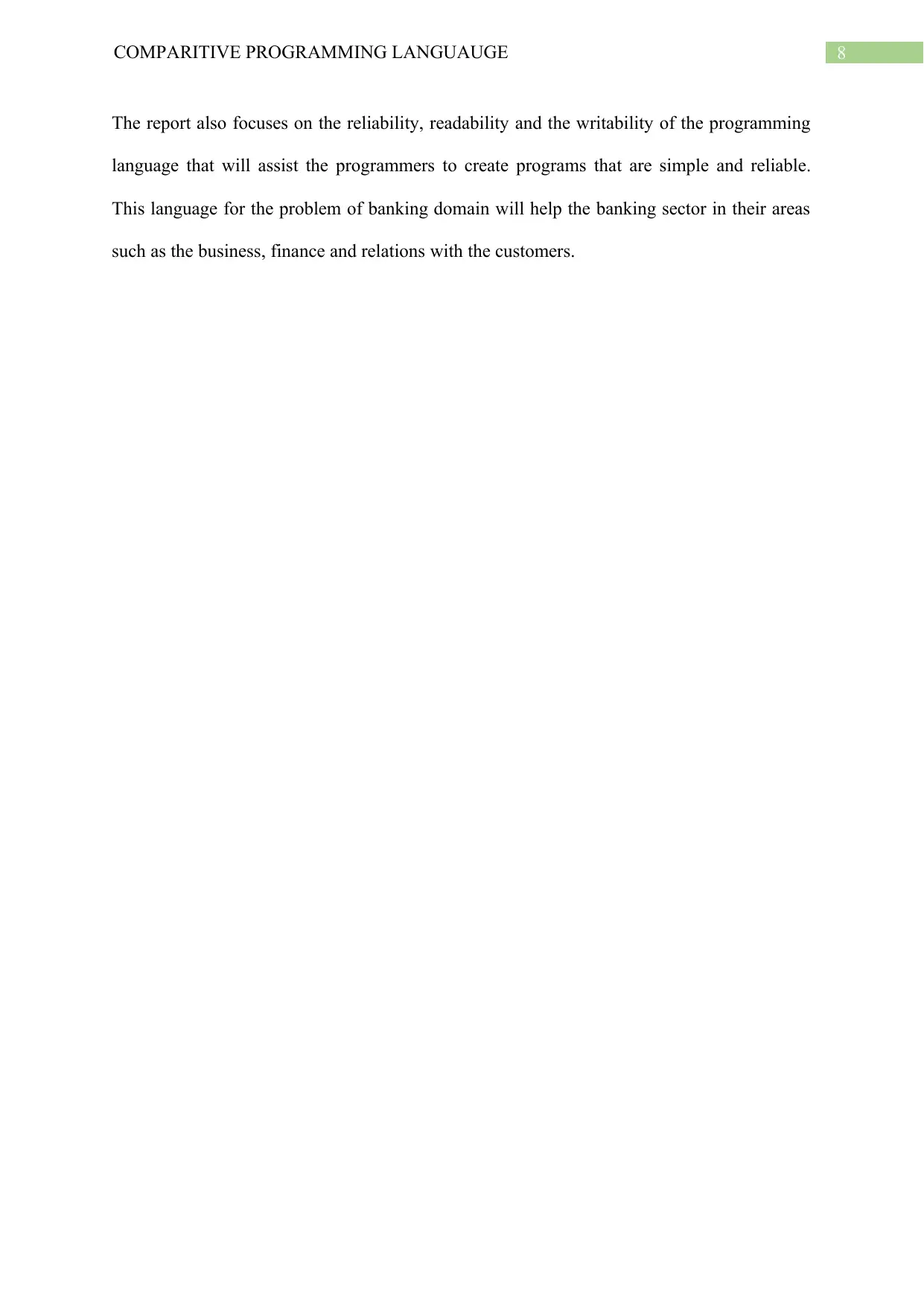
8COMPARITIVE PROGRAMMING LANGUAUGE
The report also focuses on the reliability, readability and the writability of the programming
language that will assist the programmers to create programs that are simple and reliable.
This language for the problem of banking domain will help the banking sector in their areas
such as the business, finance and relations with the customers.
The report also focuses on the reliability, readability and the writability of the programming
language that will assist the programmers to create programs that are simple and reliable.
This language for the problem of banking domain will help the banking sector in their areas
such as the business, finance and relations with the customers.
⊘ This is a preview!⊘
Do you want full access?
Subscribe today to unlock all pages.

Trusted by 1+ million students worldwide
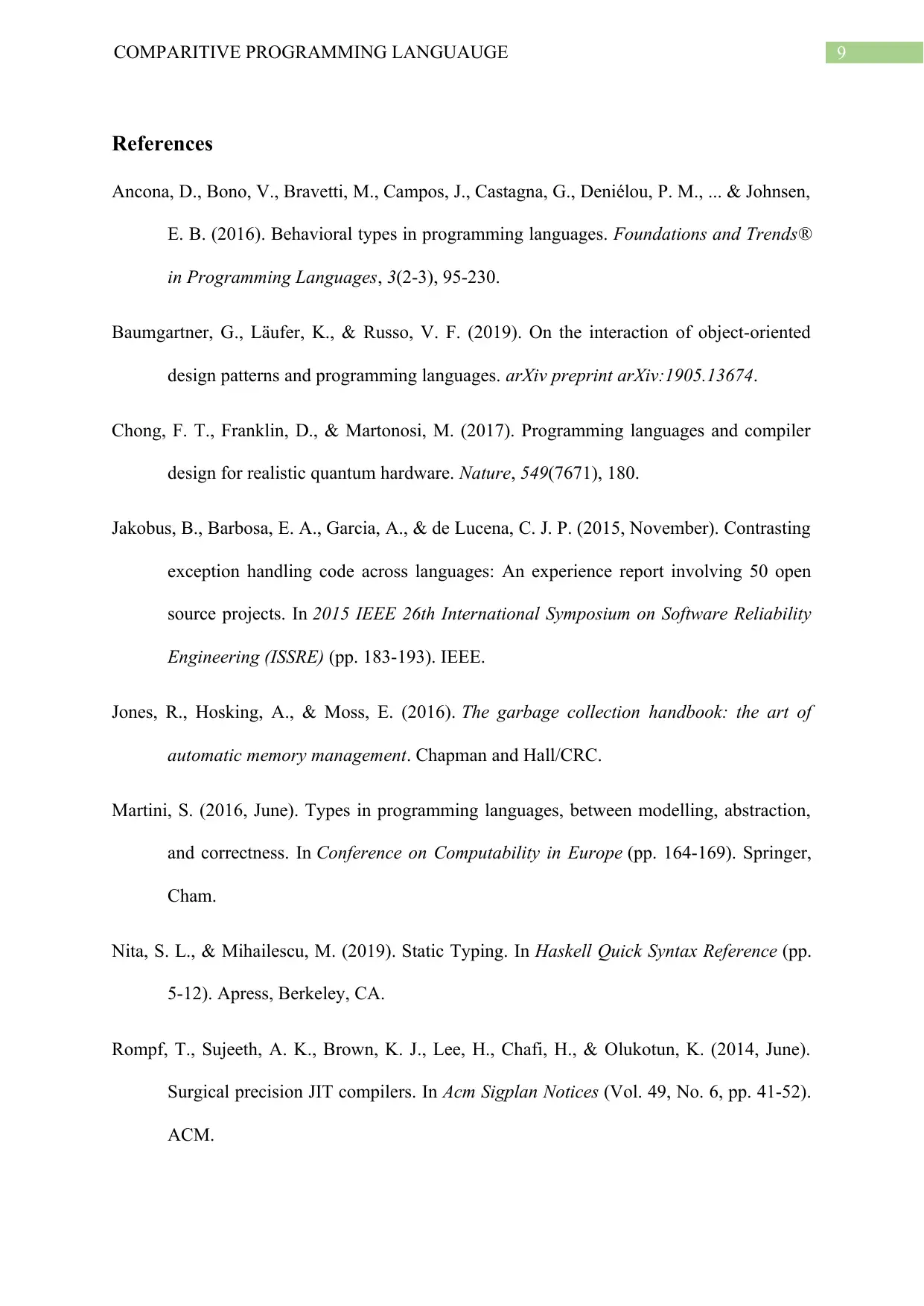
9COMPARITIVE PROGRAMMING LANGUAUGE
References
Ancona, D., Bono, V., Bravetti, M., Campos, J., Castagna, G., Deniélou, P. M., ... & Johnsen,
E. B. (2016). Behavioral types in programming languages. Foundations and Trends®
in Programming Languages, 3(2-3), 95-230.
Baumgartner, G., Läufer, K., & Russo, V. F. (2019). On the interaction of object-oriented
design patterns and programming languages. arXiv preprint arXiv:1905.13674.
Chong, F. T., Franklin, D., & Martonosi, M. (2017). Programming languages and compiler
design for realistic quantum hardware. Nature, 549(7671), 180.
Jakobus, B., Barbosa, E. A., Garcia, A., & de Lucena, C. J. P. (2015, November). Contrasting
exception handling code across languages: An experience report involving 50 open
source projects. In 2015 IEEE 26th International Symposium on Software Reliability
Engineering (ISSRE) (pp. 183-193). IEEE.
Jones, R., Hosking, A., & Moss, E. (2016). The garbage collection handbook: the art of
automatic memory management. Chapman and Hall/CRC.
Martini, S. (2016, June). Types in programming languages, between modelling, abstraction,
and correctness. In Conference on Computability in Europe (pp. 164-169). Springer,
Cham.
Nita, S. L., & Mihailescu, M. (2019). Static Typing. In Haskell Quick Syntax Reference (pp.
5-12). Apress, Berkeley, CA.
Rompf, T., Sujeeth, A. K., Brown, K. J., Lee, H., Chafi, H., & Olukotun, K. (2014, June).
Surgical precision JIT compilers. In Acm Sigplan Notices (Vol. 49, No. 6, pp. 41-52).
ACM.
References
Ancona, D., Bono, V., Bravetti, M., Campos, J., Castagna, G., Deniélou, P. M., ... & Johnsen,
E. B. (2016). Behavioral types in programming languages. Foundations and Trends®
in Programming Languages, 3(2-3), 95-230.
Baumgartner, G., Läufer, K., & Russo, V. F. (2019). On the interaction of object-oriented
design patterns and programming languages. arXiv preprint arXiv:1905.13674.
Chong, F. T., Franklin, D., & Martonosi, M. (2017). Programming languages and compiler
design for realistic quantum hardware. Nature, 549(7671), 180.
Jakobus, B., Barbosa, E. A., Garcia, A., & de Lucena, C. J. P. (2015, November). Contrasting
exception handling code across languages: An experience report involving 50 open
source projects. In 2015 IEEE 26th International Symposium on Software Reliability
Engineering (ISSRE) (pp. 183-193). IEEE.
Jones, R., Hosking, A., & Moss, E. (2016). The garbage collection handbook: the art of
automatic memory management. Chapman and Hall/CRC.
Martini, S. (2016, June). Types in programming languages, between modelling, abstraction,
and correctness. In Conference on Computability in Europe (pp. 164-169). Springer,
Cham.
Nita, S. L., & Mihailescu, M. (2019). Static Typing. In Haskell Quick Syntax Reference (pp.
5-12). Apress, Berkeley, CA.
Rompf, T., Sujeeth, A. K., Brown, K. J., Lee, H., Chafi, H., & Olukotun, K. (2014, June).
Surgical precision JIT compilers. In Acm Sigplan Notices (Vol. 49, No. 6, pp. 41-52).
ACM.
Paraphrase This Document
Need a fresh take? Get an instant paraphrase of this document with our AI Paraphraser
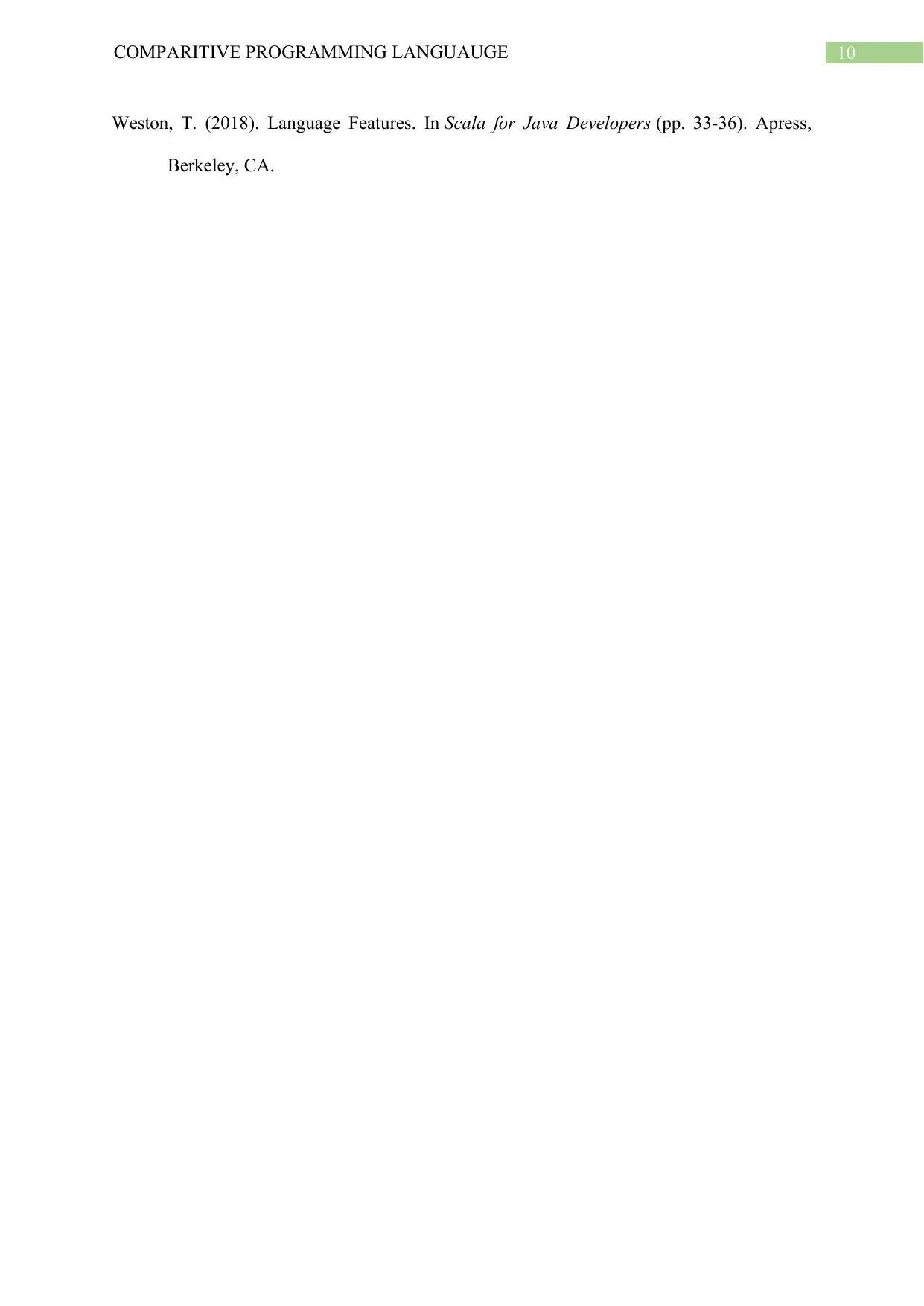
10COMPARITIVE PROGRAMMING LANGUAUGE
Weston, T. (2018). Language Features. In Scala for Java Developers (pp. 33-36). Apress,
Berkeley, CA.
Weston, T. (2018). Language Features. In Scala for Java Developers (pp. 33-36). Apress,
Berkeley, CA.
1 out of 11
Related Documents
Your All-in-One AI-Powered Toolkit for Academic Success.
+13062052269
info@desklib.com
Available 24*7 on WhatsApp / Email
![[object Object]](/_next/static/media/star-bottom.7253800d.svg)
Unlock your academic potential
Copyright © 2020–2026 A2Z Services. All Rights Reserved. Developed and managed by ZUCOL.





